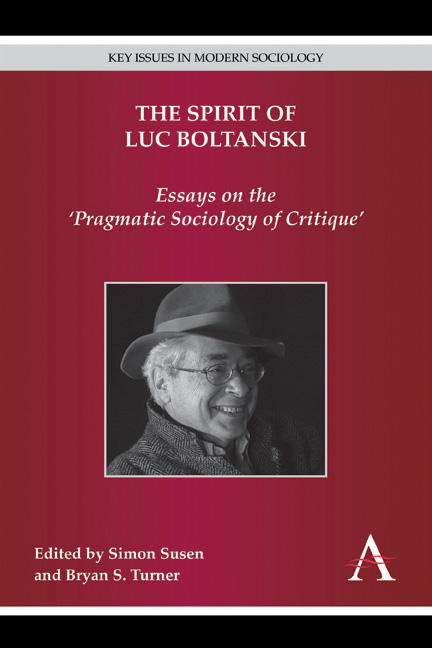Book contents
- Frontmatter
- CONTENTS
- List of Contributors
- Preface
- Part I Introductory Remarks
- Part II Luc Boltanski and (Post-) Classical Sociology
- Part III Luc Boltanski and Pragmatism
- Part IV Luc Boltanski and Critique
- Part V Luc Boltanski and Critical Sociology
- 9 Pierre Bourdieu and the Early Luc Boltanski (1960–1975): Collective Ethos and Individual Difference
- 10 Beyond Pragmatic Sociology: A Theoretical Compromise between ‘Critical Sociology’ and the ‘Pragmatic Sociology of Critique’
- 11 Towards a Dialogue between Pierre Bourdieu's ‘Critical Sociology’ and Luc Boltanski's ‘Pragmatic Sociology of Critique’
- Part VI Luc Boltanski and Political Sociology
- Part VII Luc Boltanski and Contemporary Issues
- Part VIII Luc Boltanski in Conversation
- Part IX Luc Boltanski and His Critics
- Index of Names
- Index of Subjects
10 - Beyond Pragmatic Sociology: A Theoretical Compromise between ‘Critical Sociology’ and the ‘Pragmatic Sociology of Critique’
from Part V - Luc Boltanski and Critical Sociology
Published online by Cambridge University Press: 05 December 2014
- Frontmatter
- CONTENTS
- List of Contributors
- Preface
- Part I Introductory Remarks
- Part II Luc Boltanski and (Post-) Classical Sociology
- Part III Luc Boltanski and Pragmatism
- Part IV Luc Boltanski and Critique
- Part V Luc Boltanski and Critical Sociology
- 9 Pierre Bourdieu and the Early Luc Boltanski (1960–1975): Collective Ethos and Individual Difference
- 10 Beyond Pragmatic Sociology: A Theoretical Compromise between ‘Critical Sociology’ and the ‘Pragmatic Sociology of Critique’
- 11 Towards a Dialogue between Pierre Bourdieu's ‘Critical Sociology’ and Luc Boltanski's ‘Pragmatic Sociology of Critique’
- Part VI Luc Boltanski and Political Sociology
- Part VII Luc Boltanski and Contemporary Issues
- Part VIII Luc Boltanski in Conversation
- Part IX Luc Boltanski and His Critics
- Index of Names
- Index of Subjects
Summary
Introduction
The 1980s witnessed a remarkable change in the social sciences, a significant renewal of sociological theory. In France it was an occasion to discover and appreciate, albeit with significant delay, the contribution of Anglo-Saxon sociological currents which had earlier been dismissed or underestimated, such as symbolic interactionism, ethno-methodology, and phenomenological sociology. Through the 1960s and 1970s, French sociology was limited mainly to four major currents, which Alain Touraine proposed to call ‘the four corners of sociology’, represented by Raymond Boudon, Pierre Bourdieu, Michel Crozier, and Alain Touraine himself. The debates in the social sciences during this period significantly turned around two paradigms: Marxism and structuralism. No one would deny the importance of these debates or diminish the role they played, but it is equally indisputable that, because of a polarization that constrained fertile exchange, they prevented the development of other sociological perspectives. In this intellectual configuration, the sociology of Pierre Bourdieu clearly occupied the foreground, bringing about a major renewal of social theory. In fact, pragmatic sociology, which shall be examined in this chapter, is part of its aftermath, even if its founders sought to elaborate a new model of analysis that would break with some key epistemological premises underlying Bourdieu's genetic structuralism.
Ensuing decades saw the emergence and development of new configurations in the social sciences, a refocusing of theoretical problems particularly around an analysis according to regimes of action, assessment, justification, and convention. The plurality of action through diverse modes of engagement in the world – this is what Laurent Thévenot proposes in his latest book (Thévenot, 2006). More generally, the emergence of the pragmatic style in France can be located in the late 1970s and early 1980s. One may suggest that it shares some theoretical presuppositions with the anthropology of science (Latour, 1988), and with the economy of conventions (Batifoulier, 2001). Amongst other things, it borrows from the first the concept of ‘test’ (épreuve) and uses the conventionalist perspective for the grammatical construction of regimes of action and justice (Nachi, 2006a).
- Type
- Chapter
- Information
- The Spirit of Luc BoltanskiEssays on the 'Pragmatic Sociology of Critique', pp. 293 - 312Publisher: Anthem PressPrint publication year: 2014

